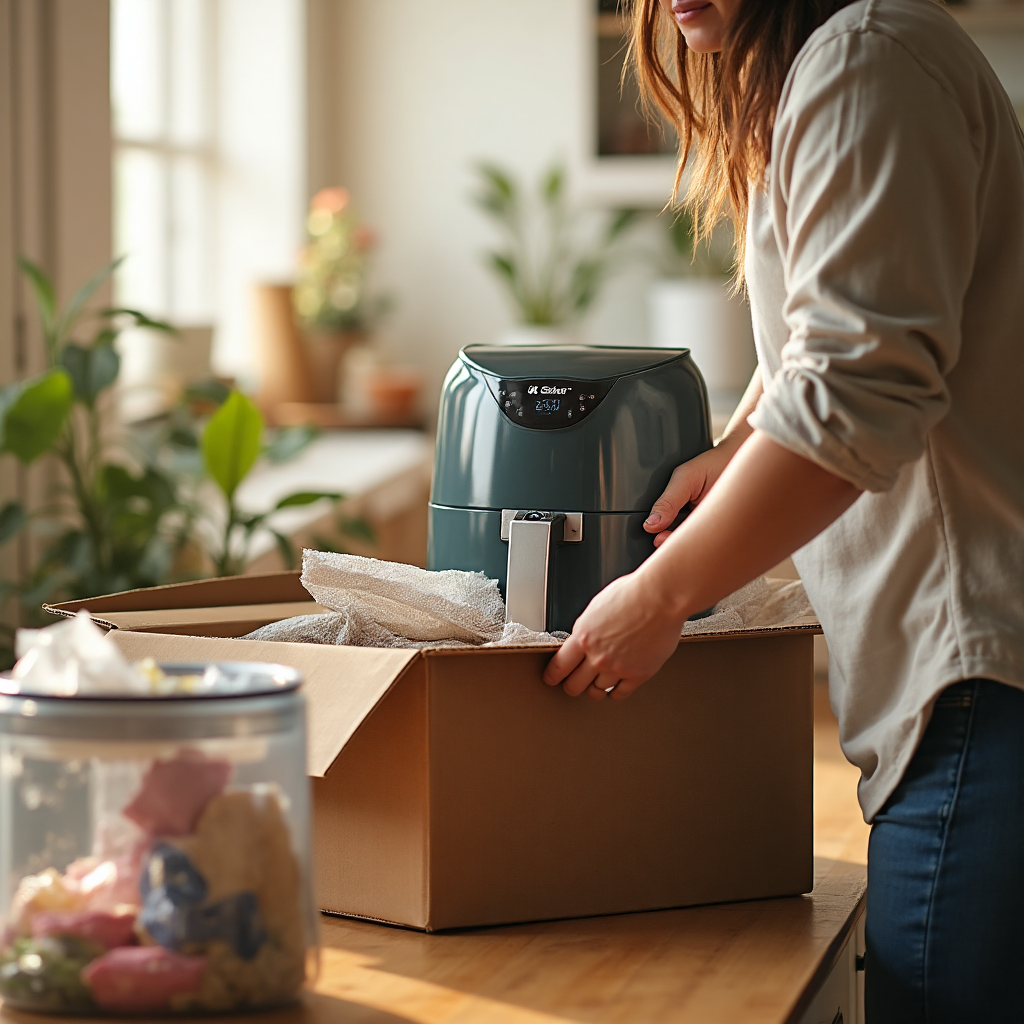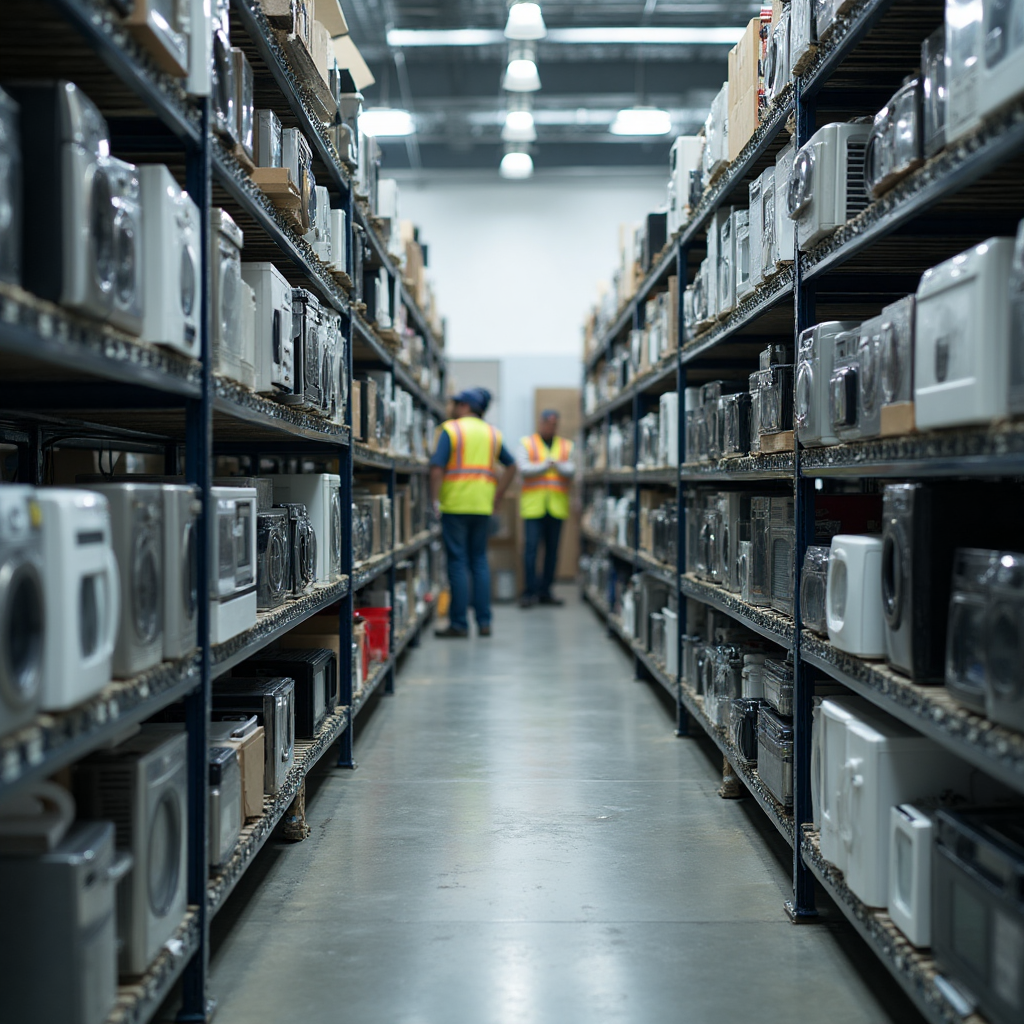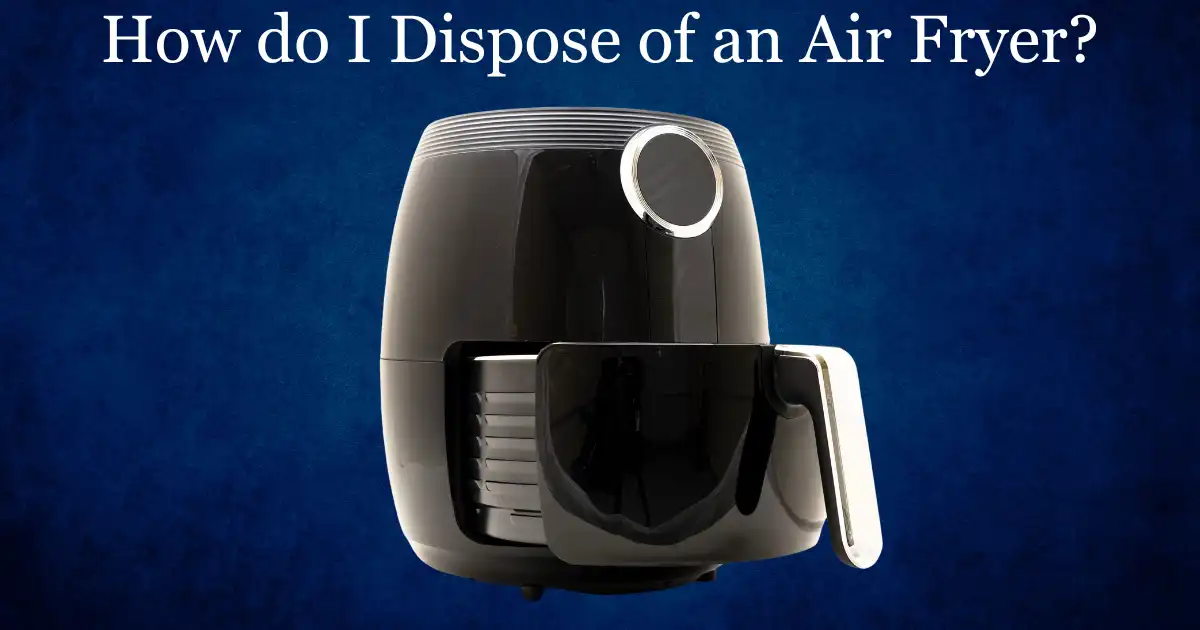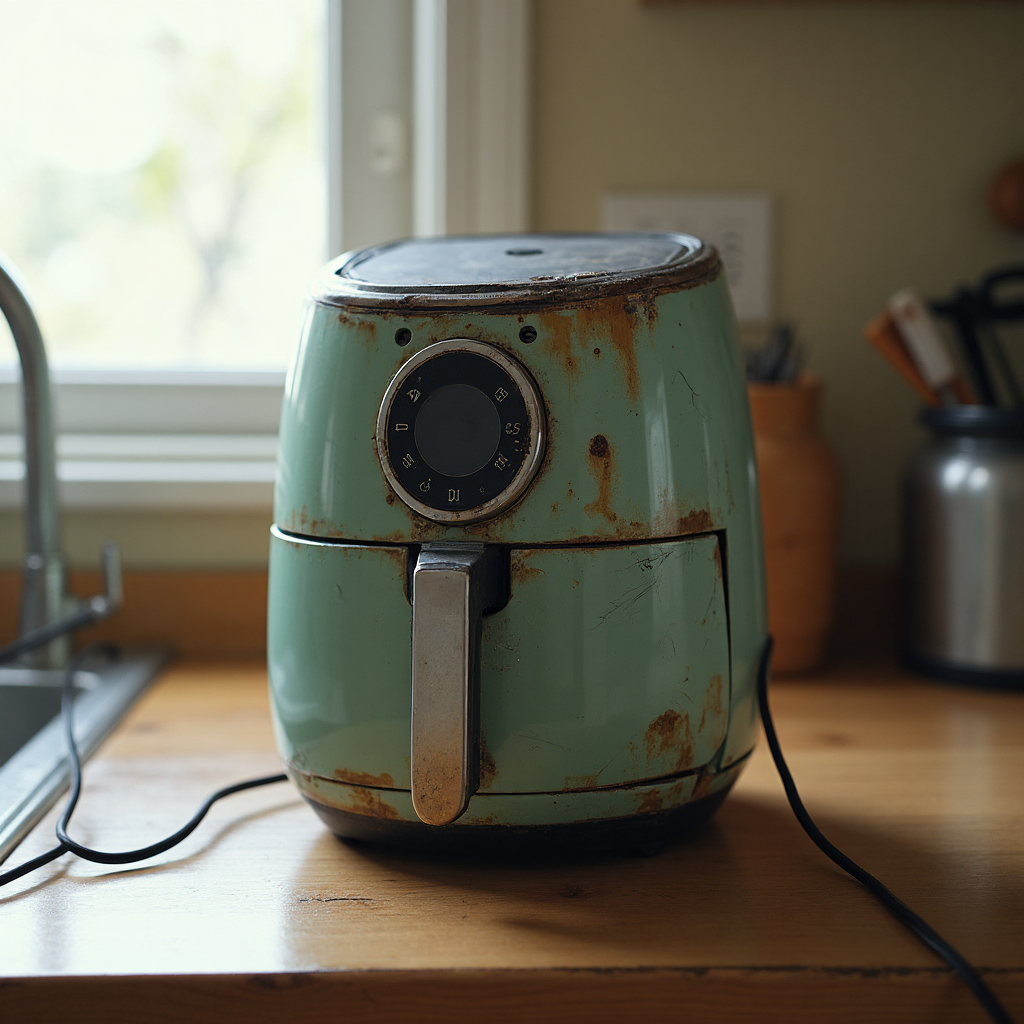How do I Dispose of an Air Fryer? You might be surprised to learn that small kitchen appliances like air fryers play a role in the staggering 50 million tons of electronic waste Americans discard annually. Shockingly, only 12.5% of this e-waste is ever recycled, leaving a significant environmental concern behind.
When your beloved air fryer stops working properly, you might wonder how to dispose of an old air fryer responsibly. Many people ask, “Can you throw an air fryer in the trash?” While technically possible, it’s far from ideal. In fact, small appliances generated 2.2 million tons of waste in 2018, with nearly 76% ending up in landfills.
Additionally, considering what to do with old air fryers matters because about 75% of the average appliance’s weight comes from steel—the most recycled material in the US. By recycling metal from household appliances, we can cut emissions by between 300 and 500 million tons and reduce mining waste by a remarkable 97%.
Throughout this article, we’ll explore the right ways to dispose of your air fryer, from recycling options to donation possibilities that keep these appliances out of our already overflowing landfills.
How do I Dispose of an Air Fryer
Tossing your air fryer into the regular trash might seem like the easiest solution, but this approach comes with serious environmental consequences. Let’s explore why proper air fryer disposal matters and how to do it right.
Environmental impact of e-waste
When electrical appliances end up in landfills, they create serious environmental problems. These devices contain components that don’t break down naturally. Consequently, they remain in landfills for generations, leaching harmful substances into soil and groundwater.
E-waste from appliances like air fryers can release toxic heavy metals including lead, mercury, and cadmium. These substances contaminate surrounding soil and water sources, potentially entering our food chain. Furthermore, when e-waste is incinerated, it releases harmful chemicals into the air, contributing to air pollution.
What materials are inside an air fryer
Understanding what’s inside your air fryer helps explain why proper disposal is essential:
- Metal components (heating elements, screws, frame)
- Plastic housing and components
- Electronic circuit boards
- Electrical wiring and cords
- Glass (in some models)
- Heating elements containing minerals like mica
Notably, many of these materials can be recycled when properly processed. The circuit boards often contain small amounts of precious metals that can be recovered and reused, reducing the need for environmentally destructive mining operations.
Can you throw an air fryer in the trash?

Technically, the legality of throwing an air fryer in regular trash varies by location. However, even where it’s not explicitly prohibited, it’s environmentally irresponsible. Many states and municipalities have specific regulations prohibiting the disposal of electronic waste in standard garbage.
Instead of sending your air fryer to a landfill, there are several preferable alternatives. Recycling centers specializing in electronic waste can properly dismantle these appliances, separating recyclable materials from hazardous components.
Responsible air fryer disposal isn’t just environmentally friendly—it’s also economically beneficial. Recycling these appliances recovers valuable materials and reduces the energy needed to produce new ones. Therefore, taking the time to dispose of your air fryer properly creates a positive impact far beyond your kitchen.
Where to Recycle an Air Fryer Responsibly

Image Source: Recycle Your Electricals
Finding the right place for air fryer disposal requires understanding your available options. I’ve researched several responsible recycling channels that specifically accept small kitchen appliances like air fryers.
Certified e-waste recycling centers
For proper air fryer disposal, look for recycling centers with recognized certifications. The two primary certification standards are:
- R2 Standard by Sustainable Electronics Recycling International (SERI) – focuses on certifying the recycling process, data destruction, and tracking materials
- e-Stewards by Basel Action Network (BAN) – ensures electronics aren’t exported to non-OECD countries
Both certifications have been establishing standards since 2008-2009. To locate certified recyclers near you, check the R2 Recyclers or e-Stewards directories online. Additionally, Earth911’s recycling database allows you to search by appliance type and ZIP code to find local recycling options.
Retailer take-back programs
Major retailers now offer convenient options for where to recycle air fryers:
Best Buy accepts most electronics for recycling regardless of where they were purchased, though they may exclude certain small appliances like rice cookers. Before visiting, check their website for the most current policies.
Staples provides in-store recycling for small coffee brewers and various electronics. They’re recognized as an e-Stewards Enterprise committed to responsible recycling practices.
Walmart has developed an innovative approach called ecoATM where you can bring old appliances and potentially receive cash or store coupons.
Manufacturer recycling programs
Manufacturers increasingly offer direct recycling options:
Hamilton Beach allows customers to send non-functioning products to their recycling program in Southern Pines, NC. They’ll properly dispose of it, recycling appropriate components.
Philips participates in the MRM electronics recycling program in several states. For further information, visit MRM’s website.
LG and GE have established dedicated recycling programs with drop-off sites nationwide for their appliances.
Before recycling through any program, remember to check if the manufacturer offers trade-in options, which might provide additional value while ensuring responsible disposal of your old air fryer.
How to Prepare Your Air Fryer for Disposal

Image Source: The New York Times
Proper preparation of your air fryer prior to disposal is essential for safety and environmental responsibility. Taking a few minutes for these steps can make a significant difference in how effectively your appliance is recycled or reused.
Unplug and let it cool
Safety first—always unplug your air fryer several days before recycling to ensure it’s completely cool. For immediate disposal, allow approximately 30 minutes for cooling after final use. Waiting too long after cooling can actually make cleaning more difficult as grease and food residue will harden and become stubborn to remove.
If you’re preparing an air fryer with a removable lid, take it off to speed up the cooling process. During cooling, place the appliance somewhere safe where no one will accidentally touch it.
Remove batteries or detachable cords
Once cooled, secure the power cord by tying it up with a twist tie or the cord itself, then tape it to the unit. This prevents tripping hazards during transport to recycling centers or donation locations.
For appliances with removable parts not made of metal (like glass or plastic components), these can be removed prior to recycling. These parts typically have limited recycling potential and may need separate disposal.
Some air fryer models contain batteries that power digital displays or timers. These should be removed and recycled separately according to local hazardous waste guidelines.
Clean the appliance if donating
If your air fryer still works and you’re donating it, thorough cleaning is crucial. Begin by ensuring the appliance is unplugged and completely cool before handling. Remove all food residue, dust, and debris that might attract pests or complicate the donation process.
For cleaning:
- Remove the frying basket and crisping tray
- Wash removable parts with hot, soapy water and a non-abrasive sponge
- For stubborn residue, soak components for about 10 minutes
- Wipe the exterior with a soft, damp cloth
- Allow all parts to dry completely before reassembling
Following these preparation steps ensures your air fryer can be properly recycled or safely passed on to its next owner.
Other Smart Ways to Dispose of an Old Air Fryer
Beyond recycling, your old air fryer might still have value to someone else. I’ve discovered several alternative disposal methods that keep appliances out of landfills while potentially helping others or even putting money back in your pocket.
Donate if it still works
If your air fryer is still functional, donation is an excellent option for air fryer disposal. Many charitable organizations welcome working small appliances:
- The Salvation Army maintains thrift stores throughout North America and can schedule pickups from locations nearest you
- St. Vincent de Paul operates thrift stores nationwide where you can arrange drop-offs or pickups
- Habitat ReStores accept working appliances, selling them at reduced prices to support their housing initiatives
Remember that all donations must be in good working order. Many organizations offer their own pickup services, making the process convenient. Additionally, you might qualify for a tax deduction when donating appliances, although it’s wise to consult your tax adviser regarding deductibility.
Sell or trade in for store credit
For working air fryers, selling offers another viable option. Alternatively, several retailers provide trade-in programs:
Best Buy’s Trade-In Program offers a convenient way to exchange used electronics for Best Buy Gift Cards or purchase credits. The value depends on factors like age, condition, required accessories, and current resale prices. Although values are non-negotiable, this provides a straightforward disposal method.
Use local Buy Nothing or Freecycle groups
Community-based gifting networks offer a personal approach to air fryer disposal:
The Buy Nothing Project operates primarily through Facebook groups where neighbors give and receive items freely. With 6,700 independent groups across 44 countries, this network transforms decluttering into a way to meet neighbors while keeping items out of landfills.
Freecycle Network is a grassroots, nonprofit movement with over 11.6 million members across 5,331 local towns. Their mission focuses on reducing waste and saving resources while creating stronger communities. Membership is free, and local towns are moderated by volunteers.
These community-based options often provide the satisfaction of knowing exactly who benefits from your unwanted appliance.
Conclusion
Responsible air fryer disposal truly makes a significant difference for our environment. Throughout this article, we’ve seen how improper disposal contributes to the growing e-waste problem, with harmful materials potentially leaching into soil and water. Undoubtedly, taking a few extra steps to dispose of your air fryer correctly helps recover valuable materials and reduces environmental impact.
Your options for proper disposal extend far beyond the trash bin. Certified e-waste recycling centers, retailer take-back programs, and manufacturer recycling initiatives all provide excellent alternatives. Additionally, if your appliance still works, donation to charitable organizations or offering it through community sharing platforms creates positive impact while helping others.
Before saying goodbye to your air fryer, remember to prepare it properly by unplugging, allowing it to cool, removing any batteries, and cleaning it thoroughly if donating. This preparation ensures safe handling and increases the likelihood of successful recycling or reuse.
Last but certainly not least, consider the broader impact of your disposal choices. Every air fryer kept out of landfills represents a small victory for sustainability. Rather than contributing to the 50 million tons of e-waste Americans produce annually, you become part of the solution. Therefore, next time your kitchen appliances reach the end of their useful life, you’ll know exactly how to dispose of them responsibly, making our planet healthier for generations to come.
FAQs
Q1. Is it safe to throw an air fryer in the regular trash? No, it’s not safe or environmentally responsible to throw an air fryer in regular trash. Air fryers contain materials that can be harmful if they end up in landfills, potentially leaching toxic substances into soil and water.
Q2. Where can I recycle my old air fryer? You can recycle your old air fryer at certified e-waste recycling centers, through retailer take-back programs (like Best Buy or Staples), or via manufacturer recycling programs. Some local recycling facilities also accept small appliances.
Q3. How should I prepare my air fryer for disposal? To prepare your air fryer for disposal, unplug it and let it cool completely. Remove any batteries or detachable cords, and if you’re donating it, clean it thoroughly. Secure loose parts and cords to prevent hazards during transport.
Q4. Can I donate my air fryer if it still works? Yes, you can donate your working air fryer to various charitable organizations such as The Salvation Army, St. Vincent de Paul, or Habitat ReStores. Local community groups like Buy Nothing or Freecycle are also great options for donating.
Q5. Are there any alternatives to recycling or donating my air fryer? Yes, you can consider selling your air fryer if it’s still in good condition. Some retailers also offer trade-in programs where you can exchange your old appliance for store credit. These options can help extend the life of your air fryer and keep it out of landfills.

